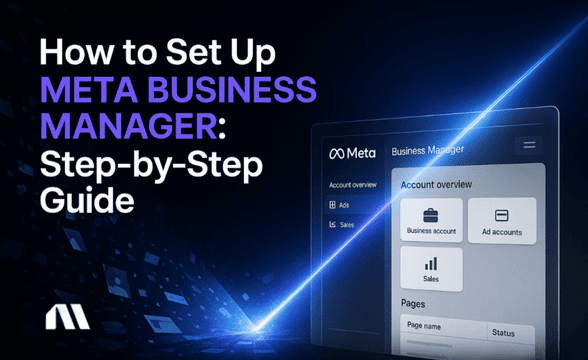Discover what media buyers do, essential skills for 2025, salary data ($45K-$135K), and how AI is transforming the industry. Career pathway guide included.
Many e-commerce owners find themselves second-guessing their ad spend, wondering why one campaign scales profitably while the next burns through budget with nothing to show for it. That’s where a media buyer comes in.
A media buyer is a marketing professional who purchases advertising space and time across digital platforms to reach target audiences and drive business results. They're the strategic minds behind those ads that actually convert, handling everything from audience targeting and budget allocation to bid optimization and performance analysis.
In today's digital-first world, media buyers have evolved far beyond the traditional role of negotiating TV and radio spots. They're now data-driven strategists who navigate complex algorithms, manage multi-platform campaigns, and turn advertising spend into measurable business growth. For e-commerce businesses, especially, a skilled media buyer can be the difference between scaling profitably and burning through your marketing budget.
What You'll Learn
By the end of this guide, you'll understand exactly what media buyers do on a daily basis, the skills they need to succeed, and current salary expectations. Plus, we'll explore how AI tools are revolutionizing the industry and what that means for businesses looking to hire or work with media buyers.
Media Buyer Definition and Core Role
Let's get specific about what media buyers actually do. At its core, media buying is the process of purchasing advertising inventory to reach your target audience at the right time, in the right place, and at the right price. But it's become much more sophisticated than simply buying ad space.
Modern media buyers are part strategist, part analyst, and part negotiator. They don't just place ads – they craft comprehensive campaigns that align with business objectives, whether that's driving e-commerce sales, generating leads, or building brand awareness.
Media Buyer vs. Media Planner: What's the Difference?
Here's where it gets interesting. While media planners focus on the "what" and "where" of advertising strategy, media buyers handle the "how" and "when" of execution. Think of planners as the architects who design the blueprint, while buyers are the contractors who actually build the house.
Media planners research audiences, analyze market trends, and develop strategic recommendations. Media buyers take those plans and execute them, negotiating rates, managing budgets, and optimizing campaigns for performance. In smaller companies or agencies, one person might wear both hats, but the skill sets are distinctly different.
The digital revolution has transformed this relationship. Today's media buyers work primarily with programmatic platforms, real-time bidding systems, and AI-powered optimization tools rather than traditional media sales reps. This shift has made the role more technical and data-driven than ever before.
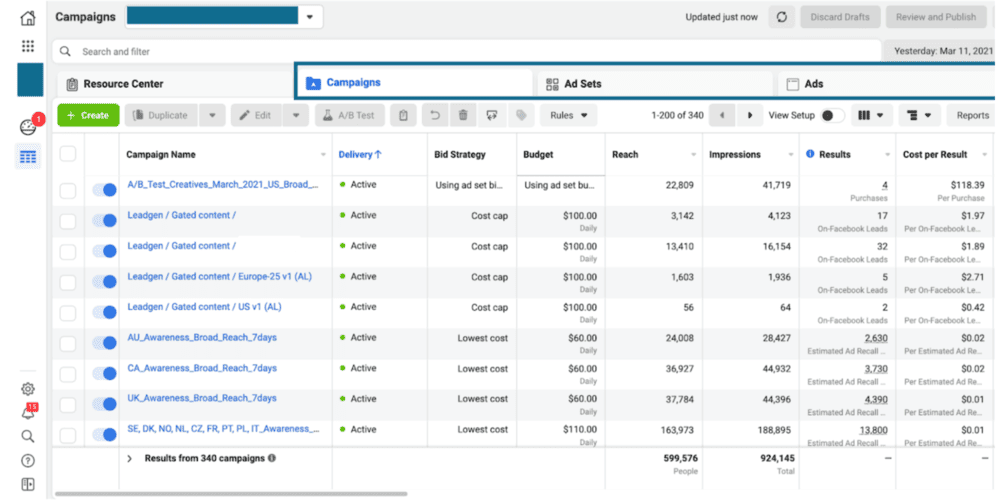
Daily Responsibilities and Tasks
Ever wondered what a media buyer's day actually looks like? It's a blend of strategic thinking, tactical execution, and constant optimization. Here's a sample of the reality:
Morning Routine: Performance Analysis (8:00-10:00 AM)
The day starts with coffee and data. Media buyers dive into overnight performance metrics, checking which campaigns delivered results and which ones need immediate attention. They're looking at cost per acquisition, return on ad spend, click-through rates, and conversion metrics across all active campaigns.
This isn't just number-crunching – it's detective work. Why did Campaign A suddenly spike in cost? Did the audience size change? Is there increased competition? Smart media buyers can spot trends and anomalies that less experienced marketers miss entirely.
Pro Tip: Set up automated alerts for significant performance changes. This helps you catch issues before they drain your budget and identify scaling opportunities faster.
Midday Activities: Creative Testing and Audience Refinement (10:00 AM-2:00 PM)
Once they understand what happened overnight, it's time to take action. This might involve launching new creative tests, adjusting audience targeting, or reallocating budget between campaigns. Media buyers are constantly experimenting – testing new ad formats, trying different audience segments, and refining their targeting parameters.
For e-commerce businesses, this is where the magic happens. A skilled media buyer might notice that video ads are outperforming static images for a particular product category, or that customers acquired through lookalike audiences have higher lifetime values than those from interest-based targeting.
Afternoon Focus: Budget Allocation and Bid Management (2:00-5:00 PM)
The afternoon is all about optimization and scaling. Media buyers analyze which campaigns are ready for increased investment and which ones need budget cuts. They adjust bids based on performance data, pause underperforming ad sets, and scale winning campaigns.
This requires a delicate balance. Scale too quickly, and you might exhaust your audience or drive up costs. Scale too slowly, and you miss opportunities for growth. Experienced media buyers develop an intuitive sense for these decisions, backed by solid data analysis.
End-of-Day: Reporting and Strategy Planning (5:00-6:00 PM)
The day wraps up with reporting and planning for tomorrow. Media buyers compile performance summaries for clients or stakeholders, document insights and learnings, and plan the next day's optimization tasks. They're also staying current with platform updates, industry news, and emerging trends that could impact their campaigns.
Essential Skills for 2025 Success
The media buying landscape has evolved dramatically, and so have the required skills. Here's what separates successful media buyers from the rest in 2025:
Technical Platform Expertise
First and foremost, media buyers need deep knowledge of advertising platforms. Meta Ads Manager remains the cornerstone for most e-commerce businesses, but buyers also need proficiency in Google Ads, LinkedIn Ads, TikTok Ads, and emerging platforms.
But it's not enough to know where the buttons are. Successful media buyers understand the underlying algorithms, auction dynamics, and optimization strategies that drive platform performance. They know when to use broad targeting versus specific interests, how to structure campaigns for different objectives, and which bidding strategies work best for various business models.
Advanced Analytics and Data Interpretation
Modern media buying is incredibly data-driven. Buyers need to be comfortable with analytics platforms, attribution models, and statistical analysis. They should understand concepts like incrementality testing, multi-touch attribution, and customer lifetime value optimization.
This goes beyond basic reporting. The best media buyers can identify patterns in data that others miss, understand the relationship between different metrics, and make strategic decisions based on statistical significance rather than gut feelings.
Creative Performance Understanding
While media buyers don't typically create ads themselves, they need to understand what makes creative content perform. This includes knowledge of Facebook ad examples that convert, video best practices, and how creative elements impact campaign performance.
They should be able to provide feedback to creative teams, identify winning creative patterns, and understand how different creative approaches affect audience engagement and conversion rates.
Strategic Business Thinking
The best media buyers think like business owners. They understand how advertising fits into broader business objectives, can calculate customer acquisition costs in relation to lifetime value, and make recommendations that drive sustainable growth rather than just short-term metrics.
This means understanding seasonality, competitive dynamics, and market positioning. A strategic media buyer might recommend pulling back on acquisition during low-margin periods or shifting budget allocation based on inventory levels.
Quick Tip: Always connect your media buying decisions to business outcomes. It's not just about improving CTR – it's about driving profitable growth for the business.
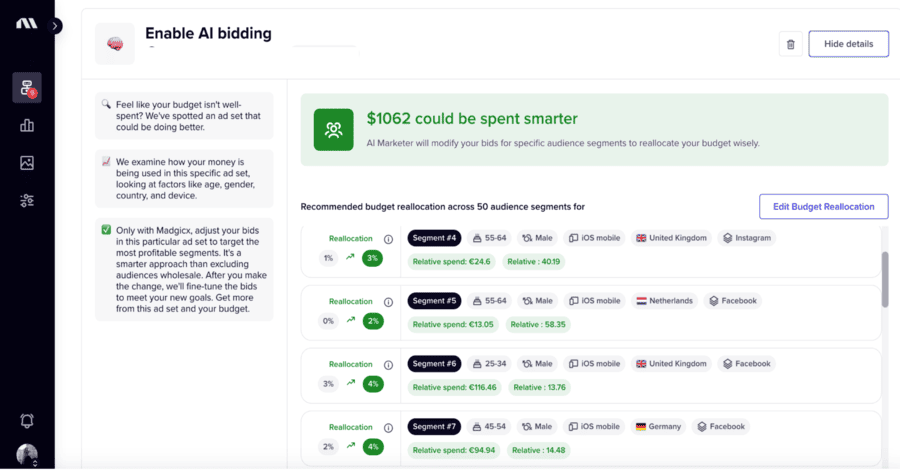
Tools and Technology Stack
The modern media buyer's toolkit has expanded far beyond individual platform interfaces. Here's what professionals are using in 2025:
Primary Advertising Platforms
Facebook advertising and Instagram ads remain central to most e-commerce strategies, but the platform landscape has diversified. Google Ads handles search intent and YouTube advertising, while LinkedIn serves B2B campaigns. TikTok has emerged as a major player for younger demographics, and Pinterest drives significant e-commerce traffic for certain verticals.
Each platform has its own optimization nuances, audience behaviors, and creative requirements. Successful media buyers develop expertise across multiple platforms while maintaining deep specialization in the channels most relevant to their business or clients.
Analytics and Attribution Tools
Google Analytics 4 provides foundational website analytics, but media buyers increasingly rely on specialized attribution platforms that can track customer journeys across multiple touchpoints. These tools help answer crucial questions like: Which ads actually drive conversions? How do different channels work together? What's the true incrementality of paid advertising?
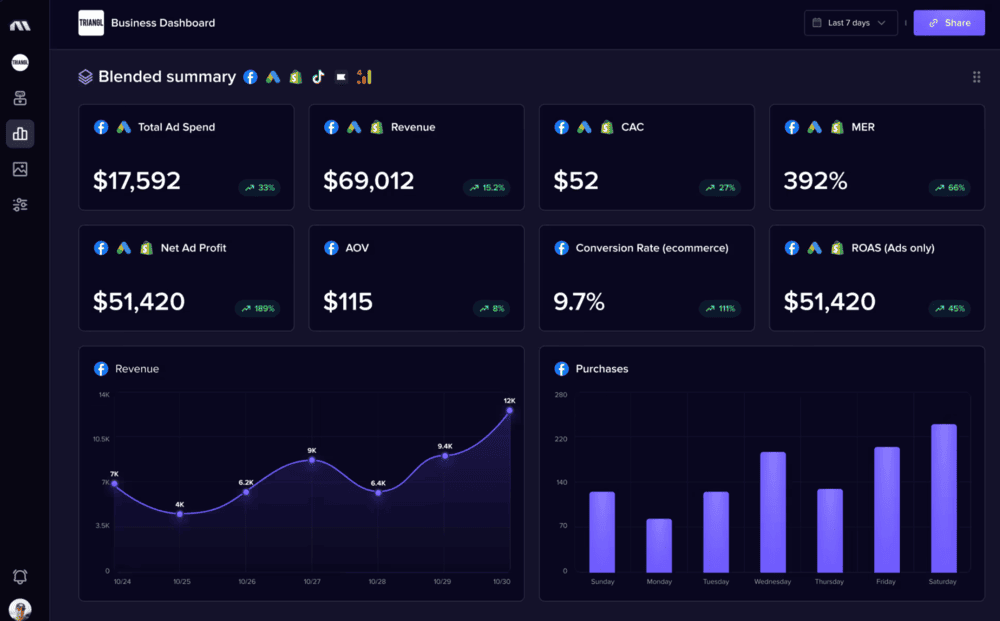
Automation and AI Platforms
This is where the industry is heading fast. Platforms like Madgicx with the AI Marketer are transforming how media buying works by automating routine optimization tasks, providing AI-powered recommendations, and managing campaigns 24/7. These Facebook ad tools don't replace media buyers – they amplify their capabilities and free them up for strategic work.
The AI handles bid adjustments, budget reallocation, and performance monitoring, while human buyers focus on strategy, creative direction, and business alignment. It's a partnership that's becoming essential for competitive performance.

Creative and Design Tools
While not always creating ads themselves, media buyers need familiarity with creative tools for quick edits, testing variations, and communicating with design teams. Canva serves basic needs, while Adobe Creative Suite handles more complex requirements.
Career Path and Salary Information (2025 Data)
Let's talk numbers. The media buying field offers solid earning potential with clear advancement opportunities, especially as digital advertising continues its explosive growth.
Entry-Level: Junior Media Buyer ($45,000-$60,000)
Starting positions typically between 0-4 years of experience and focus on campaign execution under supervision. Junior buyers handle day-to-day optimization tasks, assist with campaign setup, and learn platform mechanics. Many start as interns or in general marketing roles before specializing in media buying.
Mid-Level: Media Buyer ($54,000-$64,000)
According to recent industry data, the average media buyer salary sits comfortably in this range. At this level, professionals manage their own campaigns, work directly with clients or stakeholders, and make strategic optimization decisions. They typically have 5-9 years of experience and proven track records of campaign performance.
Senior-Level: Senior Media Buyer/Manager ($90,000-$135,000)
Senior positions involve team leadership, strategic planning, and complex account management. These professionals often oversee multiple campaigns or team members, develop media strategies, and serve as primary client contacts. They bring 10+ years of experience and demonstrated expertise in scaling campaigns profitably.
Specialized Roles and Bonuses
Many media buyers earn performance bonuses based on campaign results, client retention, or agency profitability. Specialized skills in emerging platforms, programmatic advertising, or specific verticals (like e-commerce or SaaS) command premium salaries.
Geographic location significantly impacts compensation, with Media Buyers in San Jose, CA, earning the most, averaging 97% above the national average. Boston, MA follows closely with salaries 53% higher, while Austin, TX offers a 20% increase over the national benchmark. Remote work has somewhat leveled this playing field, allowing talented buyers to access higher-paying opportunities regardless of location.

How to Become a Media Buyer
Breaking into media buying doesn't require a specific degree, but it does demand the right combination of skills, experience, and continuous learning. Here's the practical path:
1. Education and Foundational Knowledge
While many successful media buyers have marketing, business, or communications degrees, it's not a strict requirement. What matters more is understanding digital marketing fundamentals, basic analytics, and business principles. Many professionals transition from other marketing roles or even completely different fields.
The key is demonstrating analytical thinking, attention to detail, and genuine interest in digital advertising. Employers value practical skills and proven results over specific educational backgrounds.
2. Building Relevant Experience
Start by getting hands-on experience with advertising platforms. This might mean managing ads for a small business, volunteering for nonprofits, or even running campaigns for your own projects. The goal is to understand how platforms work and develop a track record of results.
Many successful media buyers start in entry-level marketing roles at agencies or in-house marketing teams. These positions provide exposure to campaign management, client communication, and strategic thinking while building platform expertise.
3. Platform Certifications and Skill Development
Invest time in official platform certifications. Facebook Blueprint, Google Ads certifications, and LinkedIn Marketing Labs provide structured learning paths and industry-recognized credentials. These certifications demonstrate a commitment to the field and provide foundational knowledge.
But don't stop at certifications. Follow industry blogs, join professional communities, and stay current with platform updates and best practices. The digital advertising landscape changes rapidly, and successful media buyers are lifelong learners.
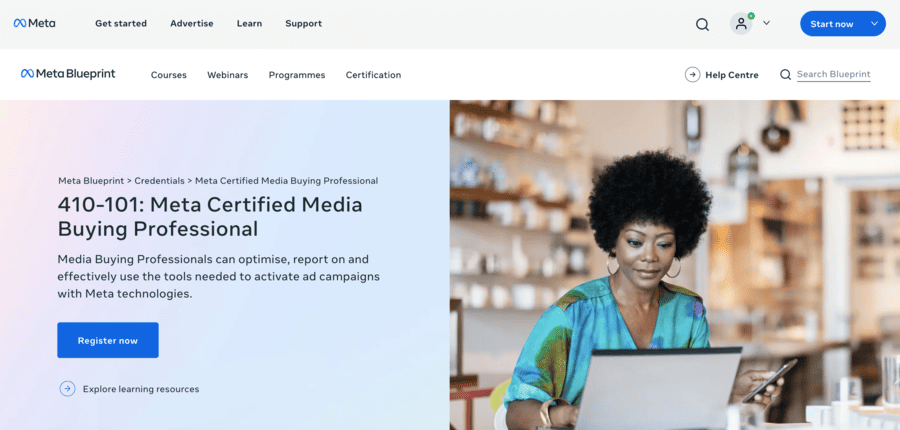
According to Meta, once you’ve nailed the media buying professional course, you can specialize in any of the following advanced tracks:
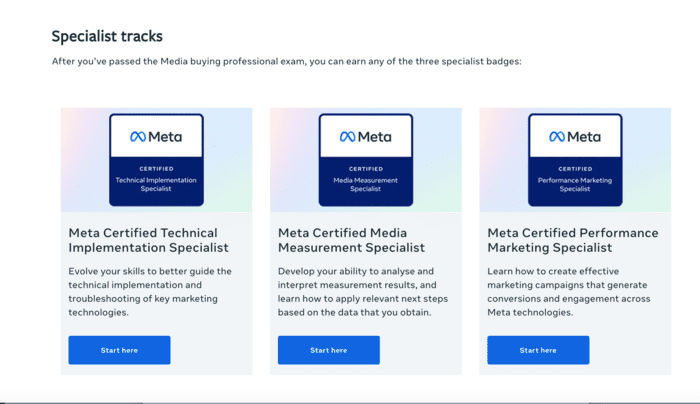
4. Portfolio Development
Document your campaign results, optimization strategies, and business impact. Even if you're starting with small budgets or personal projects, track your performance metrics and be ready to discuss your approach to campaign management.
Focus on business outcomes rather than just platform metrics. Employers want to see how your media buying activities drove revenue, reduced acquisition costs, or achieved other business objectives.
Pro Tip: Create case studies that show your problem-solving process, not just the final results. Employers want to understand how you think through optimization challenges.
Industry Trends Shaping 2025
The media buying landscape is evolving rapidly, driven by technological advancements, privacy changes, and shifting consumer behaviors. Here's what's defining the industry in 2025:
1. AI and Automation Revolution
Artificial intelligence isn't just changing media buying – it's revolutionizing it. Programmatic advertising is growing at a 22.8% CAGR, with AI handling increasingly complex optimization tasks that previously required manual intervention.
This doesn't mean human media buyers are becoming obsolete. Instead, the role is evolving toward strategic oversight, creative direction, and business alignment while AI handles routine optimization tasks. The most successful media buyers are those who embrace these tools and learn to work alongside AI systems.
2. Privacy-First Advertising
iOS updates and the gradual phase-out of third-party cookies have fundamentally changed how media buyers approach targeting and measurement. First-party data has become incredibly valuable, and successful buyers are developing strategies that rely less on platform-provided targeting and more on owned audience data.
This shift requires new skills in customer data management, email marketing integration, and attribution modeling. Media buyers who can navigate this privacy-first landscape have significant competitive advantages.
3. E-commerce Dominance
Digital advertising now represents 72.7% of total ad investment, with e-commerce playing a big role in this growth. Media buyers specializing in e-commerce campaigns – understanding product catalogs, dynamic ads, and customer lifetime value optimization – are in particularly high demand.
This trend has created opportunities for media buyers to develop deep vertical expertise, commanding higher salaries and working with more sophisticated campaigns.
4. Attribution and Measurement Complexity
As customer journeys become more complex and privacy restrictions limit tracking capabilities, attribution has become both more important and more challenging. Media buyers need to understand multi-touch attribution, incrementality testing, and marketing mix modeling to accurately measure campaign performance.
This complexity has created demand for media buyers with strong analytical skills who can navigate attribution challenges and provide accurate performance reporting.

Frequently Asked Questions
What's the difference between a media buyer and a media planner?
Media planners develop advertising strategies and determine where and when to place ads, while media buyers execute those plans by purchasing ad inventory and optimizing campaign performance. Planners focus on strategy and research; buyers focus on execution and optimization. In smaller organizations, one person often handles both roles.
Do I need a degree to become a media buyer?
While many media buyers have marketing or business degrees, it's not strictly required. Employers prioritize practical skills, platform expertise, and proven results over specific educational backgrounds. Many successful media buyers have transitioned from other fields or built their skills through hands-on experience and platform certifications.
How much do entry-level media buyers make?
Entry-level media buyers typically earn $45,000-$60,000 annually, with significant variation based on location, company size, and industry. Performance bonuses and rapid advancement opportunities can quickly increase earning potential for successful candidates.
What platforms do media buyers use most?
Facebook and Instagram advertising dominate most media buyers' daily work, especially for e-commerce businesses. Google Ads is essential for search marketing, while LinkedIn serves B2B campaigns. TikTok, Pinterest, and other platforms are increasingly important depending on target demographics and business objectives.
Is media buying a good career choice in 2025?
Media buying offers strong career prospects with growing demand, competitive salaries, and opportunities for advancement. The field is evolving with AI and automation, but this creates opportunities for strategic-minded professionals who can work alongside technology to drive business results.
Start Your Media Buying Journey Today
Media buying has evolved into one of the most dynamic and rewarding careers in digital marketing. With social media advertising continuing its explosive growth and businesses increasingly relying on paid acquisition, skilled media buyers are more valuable than ever.
Whether you're considering a career change, looking to hire your first media buyer, or wanting to understand what these professionals actually do, the fundamentals remain the same: successful media buying combines strategic thinking, analytical skills, and continuous optimization to drive measurable business results.
The industry is becoming more sophisticated, with AI platforms like Madgicx handling routine optimization tasks while human buyers focus on strategy, creative direction, and business alignment. This evolution creates opportunities for professionals who embrace technology and develop skills that complement automated systems.
For business owners, understanding the media buyer role helps you make better hiring decisions, set appropriate expectations, and evaluate performance effectively. For aspiring media buyers, focus on building practical skills, staying current with platform changes, and developing a track record of driving business results.
The future of media buying is bright, combining human strategic thinking with AI-powered optimization to create advertising campaigns that truly drive business growth. Whether you're buying media or hiring someone who does, understanding this evolving landscape is crucial for digital marketing success.
Want to see what AI-powered media buying looks like in action? Start your free 7-day trial with Madgicx.
Stop spending hours on manual Meta ad management. Madgicx's AI Marketer handles bidding, targeting, and optimization 24/7, so you can focus on growing your business while our technology maximizes your ad performance.
Digital copywriter with a passion for sculpting words that resonate in a digital age.




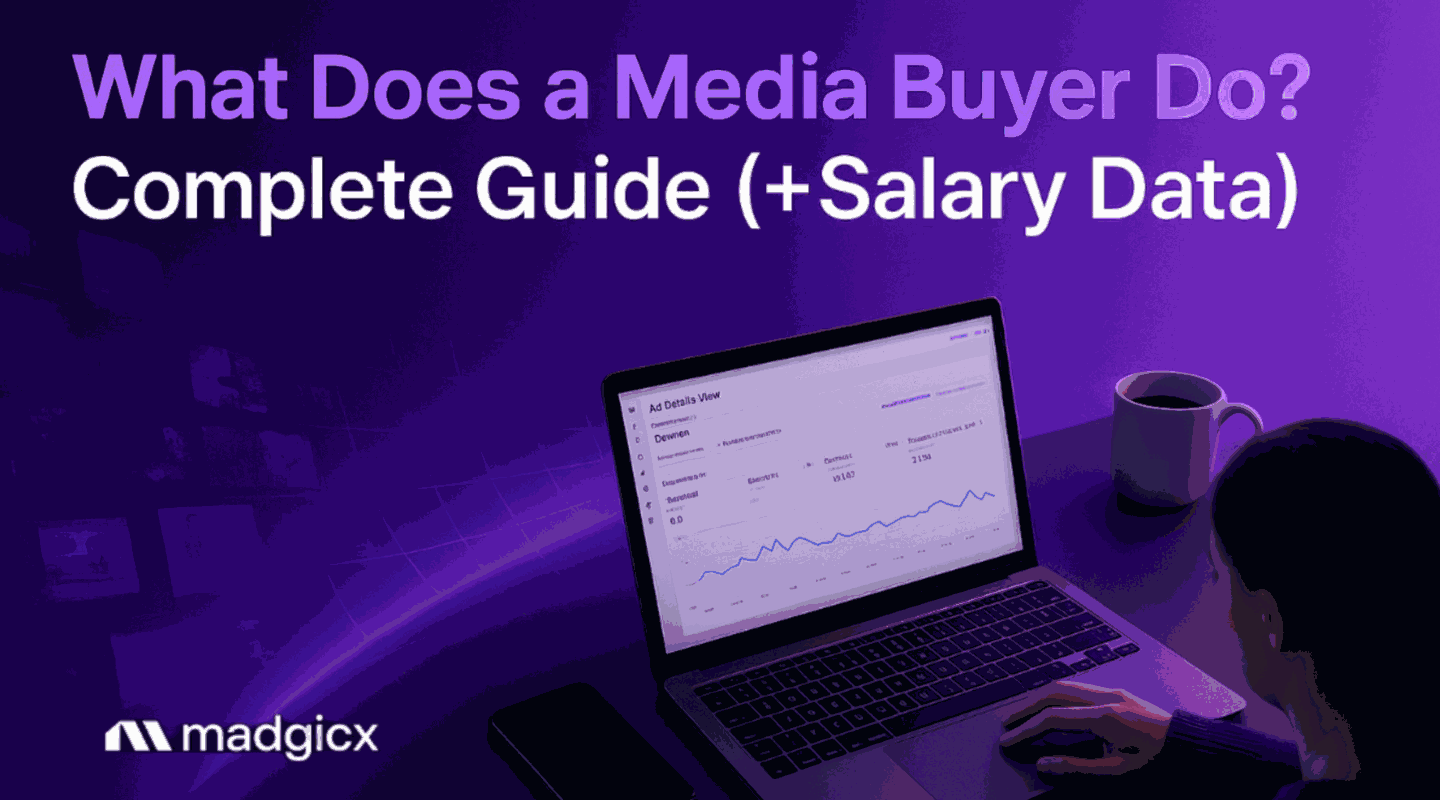


.avif)



